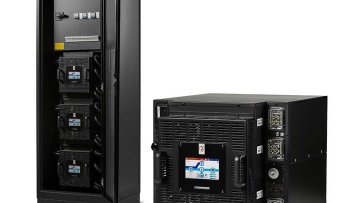Can your UPS take the heat?

The summer weather presents a number of challenges to UPS Systems, including:
- Heat-related issues: High temperatures can affect the performance and lifespan of UPS systems. Excessive heat can cause components to overheat, leading to thermal shutdowns or reduced efficiency. Cooling systems within data centres or facilities where UPS units are installed must work harder to maintain optimal operating temperatures.
- Power grid instability: During summer, electricity demand often peaks due to increased use of air conditioning systems. This heightened demand can strain power grids, leading to brownouts, voltage fluctuations, or even blackouts. UPS systems are crucial in providing backup power to critical equipment, ensuring uninterrupted operation during grid disruptions.
- Storm-related outages: Thunderstorms, windstorms, and other severe weather events are common during the summer months. Lightning strikes, high winds, and heavy rain can cause power outages, posing risks to sensitive electronic equipment. UPS systems help mitigate these risks by providing seamless power backup until normal utility service is restored.
- Increased load on UPS systems: Summer often coincides with peak business seasons for many industries, leading to higher loads on UPS systems. Data centres, hospitals, telecommunications facilities, and other critical infrastructure may experience heavier usage, requiring UPS units to support additional equipment and extended runtime.
- Maintenance challenges: Performing routine UPS maintenance on UPS systems can be more challenging during the summer, especially in hot and humid environments. Technicians may need to take extra precautions to avoid heat-related health issues while servicing UPS units in non-air-conditioned spaces or outdoor installations.
NSSE recommends regular system checks and UPS preventive maintenance to address these challenges. Checklist items include:
- Proper sizing and cooling of UPS systems to withstand high temperatures.
- Regular UPS maintenance and testing to ensure reliability and efficiency.
- Integration with building management systems to monitor environmental conditions and adjust cooling as needed.
- Redundancy and fault-tolerant configurations to minimise downtime during power disturbances.
- Remote monitoring and management capabilities to quickly respond to issues and perform diagnostics without onsite visits.
By implementing these measures, UPS systems can effectively navigate the summer weather challenges and provide reliable backup power to critical infrastructure and equipment.
Contact us for free advice and system recommendations.


